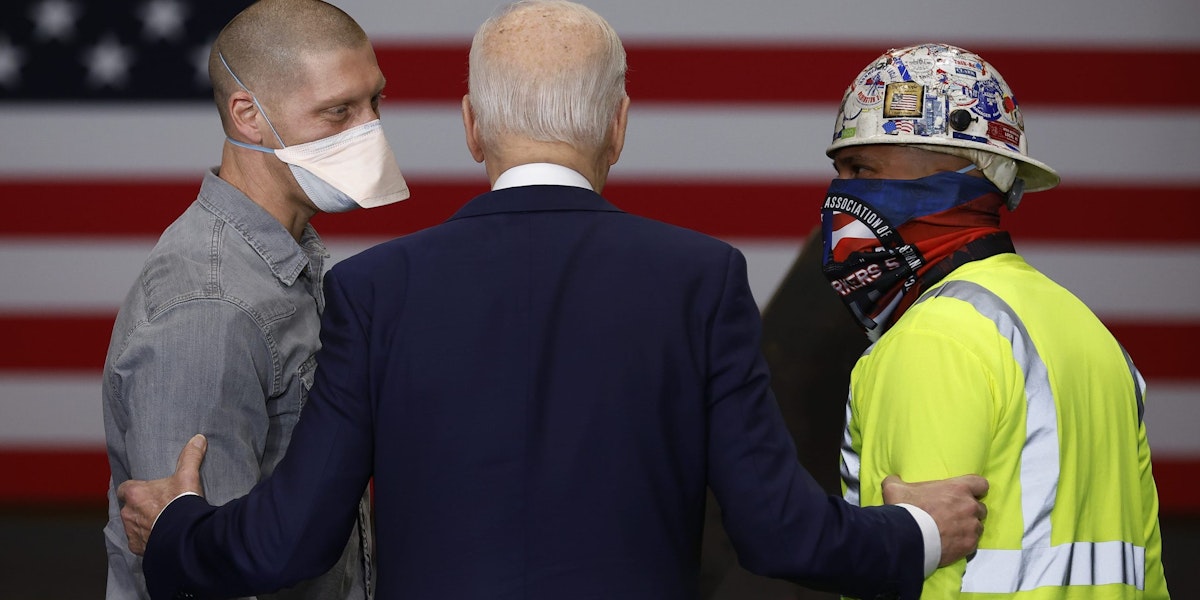Joe Biden came into office vowing to be a robustly pro-worker president, and with the midterm elections approaching, “Scranton Joe” is understandably eager to convince voters that he’s delivered to workers. Notwithstanding his efforts to deliver economic gains, many Americans complain that their glass feels far too empty, mainly because inflation is running at its highest level in four decades. But Biden says that Americans need to look at the bigger picture—yes, inflation is a major problem, he admits, but he says their glasses have filled up very nicely with him as president, thanks to strong economic growth, rapidly rising wages, and the 8.7 million jobs created since he took office—more job growth than in any other president’s first year-and-a-half in office.
Biden can make a strong case that he has delivered to blue-collar America; he can point to not just the job growth and low unemployment rate (3.6 percent), but also the American Rescue Plan Act, which kept millions of families afloat during the pandemic, and the Infrastructure Investment and Jobs Act, a $1 trillion bipartisan infrastructure law that is expected to create hundreds of thousands of blue-collar jobs. He also likes to point out that the nation has added 600,000 manufacturing jobs since he took office. (“And they said manufacturing is dead in America,” he quipped recently.) Despite these significant achievements, many voters—left, right, and center—maintain that Biden has failed to deliver in important ways, most notably, by failing to get Congress to enact his ambitious Build Back Better plan, and also, among other things, by failing to lower prescription drug prices and enact child-care subsidies.
Even though Biden has fallen short on some major items, many progressives give him good grades, often noting he can achieve only so much with a 50–50 Senate and Republicans’ frequent use of the filibuster. “Biden has been the most pro-worker and pro-union president in my lifetime, and I’m almost 50,” said Aaron Sojourner, who recently left his job as a labor economist at the University of Minnesota to become a senior researcher at the Upjohn Institute. “You’d have to go back to F.D.R. to get anybody close.”
“Biden has been the most pro-worker and pro-union president in my lifetime, and I’m almost 50….You’d have to go back to F.D.R. to get anybody close.”
Sojourner singled out the infrastructure bill as being particularly good for workers. That law, an unusual example of bipartisan cooperation, will be used to rebuild roads, bridges, railroads, and airports, to address the climate crisis, and to expand access to clean drinking water and high-speed Internet. It is expected to create hundreds of thousands of jobs, many of them union jobs, and it contains many pro-worker provisions, including an expansion of apprenticeship programs and a requirement that infrastructure projects pay the prevailing wage, which is often the union wage.
“In every speech, in every action, he’s walked the talk about the commitment he made to workers before he took the oath of office,” said Mary Kay Henry, president of the Service Employees International Union (SEIU). “I think he’s been the most pro-union president in history.”
Henry listed a half dozen actions that Biden has taken to help workers, among them, issuing an executive order that requires federal contractors to pay a minimum of $15 an hour and firing, on his first day in office, Peter Robb, a Trump appointee who was the aggressively pro-business general counsel at the National Labor Relations Board (NLRB).
But along with the praise comes plenty of disappointment. Biden failed to get Congress to enact his top legislative priority, the Build Back Better plan, which, among other things, called for free preschool for 3- and 4-year-olds, large investments in child care, building more affordable housing, and expanding Medicare to include hearing benefits. “It’s beyond frustrating not to be able to get this meaningful legislation,” said Josephine Kalipeni, executive director of Family Values @ Work. William Spriggs, an economics professor at Howard University and the AFL–CIO’s chief economist, added, “What happened with Build Back Better was a huge disappointment.”
Trump versus Biden on Worker Issues
Even though many Americans view Donald Trump as a champion of blue-collar workers, Trump did far less to help workers than Biden did. During his four years as president, Trump didn’t attempt to increase the minimum wage and failed utterly in his promises to enact a big infrastructure package. Trump rolled back overtime protections for millions of workers and made it easier for Wall Street firms to rip off the 401(k)s of hard-working Americans.
The Trump administration greatly relaxed requirements for employers to report workplace injuries and rejected a proposed ban on a toxic pesticide, chlorpyrifos, that caused acute reactions in farmworkers and hurt farmworkers’ children. Trump got Congress to cut taxes sharply on corporations and the richest Americans, while giving only minor, temporary tax cuts to American workers. Trump also tweeted out attacks against the AFL–CIO’s late president. Richard Trumka, as well as leaders of the United Steelworkers and the United Auto Workers.
Trump even appointed a pro-management corporate lawyer, Eugene Scalia, to serve as secretary of labor, while Biden named a former union leader to that position, Marty Walsh. Trump made it easier to fire federal employees and made it tougher for federal employee unions to represent workers—steps that Biden scrapped in his early days in office.
“On worker issues, it’s obvious night and day with President Biden and Donald Trump,” said Karla Walter, senior director for employment policy at the Center for American Progress. “President Trump promised an infrastructure package, but now thanks to Joe Biden, we have one. There were just so many broken promises under President Trump. He made lots of promises to working people, while also doubling down on dog whistles that divided people based on race and immigration status.”
“Trump made it easier to fire federal employees and made it tougher for federal employee unions to represent workers—steps that Biden scrapped in his early days in office.”
“What we’ve seen with Biden,” Walter continued, “is not only the president and his administration using every level of government he can to make meaningful change for working people, but really woven into that is a commitment to support working-class Americans, no matter where they come from, no matter what their race. It’s really about delivering to the working class in America.”
Biden has been a more vigorous champion of labor unions than any president in decades. There’s no denying that F.D.R. enacted more pro-union legislation, helped by the huge Democratic majority in the New Deal Congress—something that Biden no doubt wishes he had—but Biden’s rhetoric has been far more pro-union than Roosevelt’s. Biden did a video that supported Amazon workers in Alabama seeking to unionize. He attacked Kellogg’s plans to use permanent replacement workers to eliminate strikers’ jobs. Biden’s White House invited and hosted worker activists who unionized their Starbucks and Amazon facilities. On June 20, he said he was “proud” of the Apple Store workers in Towson, Maryland who voted to unionize—making their location the tech giant’s first unionized store in the United States. That day, Biden also said that union members are “the best workers in the world.”
When Biden spoke to the AFL–CIO convention in Philadelphia on June 13, he said, “Wall Street didn’t build this country, the middle class built this country, and unions built the middle class. I’m not joking. Without unions, there would be no middle class.”
With Biden’s public approval ratings sinking to just 39 percent, Spriggs, the AFL–CIO’s chief economist, said Biden was being blamed unfairly for many things beyond his control. “He can’t do anything about all the anxiety from the pandemic,” Spriggs said. “It’s been very hard to manage the political and economic situation because of all the high anxiety.”
As for inflation, Spriggs said, “I think anyone who slams him for inflation is being disingenuous.” Some economists say it makes no sense to blame Biden for inflation considering that inflation is raging across the entire industrial world—while inflation was 8.6 percent in the United States over the past year, it was 9.1 percent in the United Kingdom and 8.6 percent in the nineteen Eurozone countries. Spriggs says two factors are overwhelmingly fueling inflation, and both are largely beyond Biden’s control: “We’re in the middle of a pandemic that has caused major supply chain problems,” and then there’s the Ukraine War, which has caused fuel, food and fertilizer prices to soar.
“Anyone who says, ‘Okay, the Rescue Plan was good, but it was too big and has caused inflation, and now American workers are suffering,’ Oh, give me a break,” Spriggs said. “So much of this nonsense about inflation is just politics.”
Partly because of inflation, Biden’s approval ratings have slipped badly, which bodes ill for the Democrats’ chances in this fall’s elections. As Biden and the Democrats fight to hold onto control of the House and Senate, they recognize that working-class voters are a key constituency that they need to do a better job winning over. But many Democrats and worker advocates complain that Biden and congressional Democrats have fallen badly short in selling their achievements to working-class voters.
“I’m not convinced they’ve done the best job talking about standing up for working people,” Lee Saunders, president of the American Federation of State, County and Municipal Employees (AFSCME) said. “The Rescue Plan, infrastructure, the unemployment numbers, the solid economic growth, even with inflation continuing to be strong—he’s got to talk about these things. He’s also got to say that his agenda is unfinished, and he wants to do more to help working people and that he wants to hold corporations accountable and make them pay their fair share. He has to get that message out.”
Legislative Accomplishments and Frustrations
There are hugely conflicting views about whether Biden and the Democratic Congress—a Congress with the narrowest of Democratic majorities—have accomplished a lot, including a lot for workers. With so much attention paid to the protracted, months-long drama—and failure—to enact Build Back Better, some critics blast Biden as an inept dealmaker for having failed to get Congress to enact that bill, his top legislative priority. But others take an opposite view, saying that Biden has done extremely well on the legislative front, navigating two historically large and important pieces of legislation through a deeply divided Congress: The American Rescue Plan Act and the infrastructure bill.
The American Rescue Plan Act helped tens of millions of Americans weather the pandemic by including checks of $1,400 per person, a $300-a-week unemployment supplement, and a $3,600-a-year- tax credit for families with children under age 6. “There’s absolutely no doubt that the American Rescue Plan was dramatically different from anything we’ve ever seen before,” Spriggs said.
He heaped praise on the Rescue Plan, saying it “was the biggest piece of racially balanced equity that we’ve ever had.” Noting that many states’ unemployment programs shortchange Black workers, Spriggs said, “The $300 weekly supplement allowed the bulk of unemployed Black workers to come much closer to white workers in terms of how unemployment benefits helped Black workers. That’s not trivial. For Black businesses, Black communities, and Black workers, this was huge.”
The Rescue Plan included an important pension provision that labor unions had sought for nearly a decade: an $86 billion bailout of 185 badly underfunded pension plans that have a combined 1.5 million participants. With some pension plans teetering near insolvency, that provision will keep multi-employer pension plans well-funded for thirty years, without requiring pension cuts for workers or retirees. “We’re just happy and dancing that something got done,” said Mike Walden, a retired Teamster and the president of the National United Committee to Protect Pensions. Some critics called the measure a hugely generous giveaway to unions.
Biden’s other major legislative victory, the Infrastructure Investment and Jobs Act, will open opportunities for many blue-collar workers, a group that often complains that the Democrats have neglected them and instead favored a college-educated elite. Aaron Sojourner said the infrastructure law will be a boon for blue-collar Americans. “The infrastructure bill will not only make our economy work better and make our lives better, but 90 percent of the jobs that will be created won’t require a college degree,” said Sojourner, who is also a fellow at the Roosevelt Institute, a progressive think tank. “There have been millions of folks who have been struggling for decades with their limited skills, struggling to make a contribution, struggling to make a living. This bill is going to prove a long-term boom for many of these folks who are struggling. This is a huge investment in their success and their careers. It’s an opportunity for folks who really need it.”
“The infrastructure bill will not only make our economy work better and make our lives better, but 90 percent of the jobs that will be created won’t require a college degree,”
When Biden spoke at the AFL–CIO convention, he worked hard to make the case that he has delivered to workers and unions. After noting Trump’s repeated failure to enact a promised infrastructure bill, Biden said, “Now not only is it Infrastructure Week, we’ve arrived at Infrastructure Decade!”
Bill Samuel, the AFL–CIO’s director of government affairs, praised the Biden administration for implementing the infrastructure bill in ways that will create union jobs. In February, Biden issued an executive order that requires project labor agreements on federal construction projects of more than $35 million. These agreements aim to assure smooth labor relations and no strikes on construction projects, and they often lead to unionized companies winning construction bids. Samuel also praised Biden’s Department of Transportation for giving extra credit to contractors that have collective bargaining agreements or have pledged not to fight against unionization efforts when the department awards contracts.
Along with these accomplishments, Biden has faced many frustrations on the legislative front. He delighted worker advocates by calling for a $15-an-hour federal minimum wage (the minimum hasn’t risen from $7.25 since 2009) and by urging Congress to undo much of Trump’s tax cuts for corporations and the rich. But in an enduring frustration for Biden and his supporters, many of his legislative hopes, including his call for a higher minimum wage and increased corporate taxes, have been repeatedly blocked by Republican filibusters, and occasionally by uncooperative conservative Democrats, most notably Senator Joe Manchin and Senator Kyrsten Sinema, whose votes Biden often needs in a 50–50 Senate.
In an enduring frustration for Biden and his supporters, many of his legislative hopes, including his call for a higher minimum wage and increased corporate taxes, have been repeatedly blocked by Republican filibusters, and occasionally by uncooperative conservative Democrats.
For many worker advocates, there are two especially big frustrations on the legislative front. One is of course Biden’s failure to enact Build Back Better, which would have helped working families with its child care subsidies, free preschool, paid parental and family leave, extension of the child tax credit, and provisions to cut prescription drug costs.
Kalipeni of Family Values @ Work said it was especially frustrating that Congress had failed to enact Build Back Better during a pandemic when, with so many child care centers closed, millions of parents were straining to balance work and family. “Our care economy was on the verge of collapse,” Kalipeni said. She blames Joe Manchin far more than Joe Biden for the failure to enact Build Back Better.
Kalipeni maintains continued optimism for Biden pushing through parts of Build Back Better. “Absolutely I think he can make progress,” she said. “I think something will happen in reconciliation. I haven’t given up.” She voiced confidence that subsidized child care would be enacted as part of a future reconciliation bill, but time may be running out.
Spriggs noted that Build Back Better included numerous provisions, such as child care subsidies, that would make it easier for women to work outside the home. “If you don’t address the decline in women’s labor force participation,” he said, “the economy is in deep trouble.”
For labor unions, another big legislative frustration has been Biden’s failure to win passage of the Protecting the Right to Organize Act (PRO Act), which has long been organized labor’s top legislative priority. The bill would make it easier for workers to unionize by, for instance, creating monetary penalties for employers that illegally fire or otherwise retaliate against workers seeking to unionize. The legislation would also ban so-called captive audience meetings—anti-union meetings that employers require employees to attend. In March 2021, the House passed the PRO Act 225 to 206, but the legislation has gone nowhere in the Senate.
“I don’t think you can lay that on the president,” the AFL–CIO’s Samuel said. Biden has spoken out vigorously for the PRO Act, but in the 50–50 Senate, where several Democratic Senators, including Sinema and Mark Warner, have not endorsed the bill, there’s scant chance it can attract the sixty votes needed to overcome a GOP filibuster. (This is history repeating itself; Republican filibusters blocked efforts by Presidents Johnson, Carter, Clinton, and Obama to help unions and make it easier for workers to organize.)
Some on the left assert that Biden hasn’t done nearly enough for workers and unions, complaining the most loudly about his failure to enact the Protecting the Right to Organize Act. These critics act as if Biden is a wizard who had superpowers over Congress; they seem to forget that, with a federal government based on the separation of powers, any president’s hands—and powers—would be extremely constrained by a 50–50 Senate and filibusters.
At the AFL–CIO convention, Liz Shuler, the federation’s president, said she hoped Biden would, in coming months, get Congress at least to enact the PRO Act provision that calls for creating monetary penalties for labor law violators. She said she hoped it would be part of a reconciliation bill that includes various pieces from the Build Back Better Act. Unions have long complained that the National Labor Relations Act (NLRA) doesn’t allow for any fines whatsoever against employers, even ones that repeatedly violate the law when fighting against unionization efforts—for instance, by unlawfully firing workers who express their support for a union.
“There is nothing more important than giving some teeth to our labor laws,” said Celine McNicholas, director of government affairs at the Economic Policy Institute (EPI).
Executive Orders
Frustrated by filibuster after filibuster, Biden has often turned to executive orders to take pro-worker actions. “We’ve had some disappointments because of Congressional roadblocks, but in terms of what’s in their power to do, they’ve been doing a lot,” said Rebecca Dixon, executive director of the National Employment Law Project.
The Biden administration has issued several important pro-worker executive orders that represent significant achievements:
- Setting a $15 minimum wage for workers employed by federal contractors: Biden’s Executive Order 14026 increased the minimum pay for these workers to $15 an hour, up from the $10.10-an-hour minimum that President Obama set in 2015. Not stopping there, Biden’s executive order indexes the $15 wage to inflation, so the minimum wage will rise each year. Biden’s order also raised the minimum tipped wage that federal contractors can pay their workers, from $7.90 to $10.50, and will eliminate a lower tipped minimum wage entirely by 2024.
- Reducing displacement of workers hired under federal contracts: Executive Order 14055 requires companies that win federal service contracts, such as cafeteria contractors or cleaning contractors, to hire the employees of the predecessor service contractor. The White House said this order not only will protect employed workers from layoffs, but also will prevent disruptions in federal services and make it easier for employers to find trained workers.
- Creating a White House Task Force on Worker Organizing and Empowerment: Executive Order 14025 states that the decline in union membership “has had a host of negative consequences for American workers and the economy.” In February, the task force authorized by this executive order released an enthusiastically pro-union report that made seventy recommendations and noted that union households earn up to 20 percent more than non-union households. The report called for expanding collective bargaining rights for federal Transportation Security Administration employees, requiring disclosure whenever federal contractors use anti-union consultants or lawyers, and having the U.S. Department of Labor do more to educate workers about their right to unionize.
Biden has also issued executive orders that promote project labor agreements, increase diversity in the federal workforce, and ensure adequate safety from COVID-19 for the employees of federal contractors.
Seeing how the decline in manufacturing has devastated many communities, Biden has very visibly sought to show that he is bringing back good manufacturing jobs. He boasts that he has adopted the toughest Buy American provisions in decades “to ensure taxpayer dollars create good-paying jobs here at home.” He has been pushing a bipartisan bill to invest billions of dollars in America’s semiconductor industry in the hope of encouraging construction of chip factories in the United States and relying less on overseas factories. As part of this effort, he pointed to Intel’s announcement that it would build a $20 billion semiconductor factory outside Columbus, Ohio, a move expected to create 7,000 construction jobs and 3,000 permanent factory jobs.
Seeing how the decline in manufacturing has devastated many communities, Biden has very visibly sought to show that he is bringing back good manufacturing jobs.
Agency Actions
Beyond his appointment of Marty Walsh as secretary of labor, Biden has appointed many other well-known pro-union and pro-worker advocates to agency positions, including Julie Su, California’s former commissioner of labor, as deputy secretary of labor. As head of the Occupational Safety and Health Association (OSHA), Biden named Doug Parker, who previously headed California’s Division of Occupational Safety and Health.
Biden has named Lauren McFerran, a former top aide to Senator Edward Kennedy, to serve as chair of the National Labor Relations Board. In addition, he named Dave Prouty, a former SEIU general counsel, to the NLRB, as well as Gwynne Wilcox, a New York lawyer who was associate general counsel for 1199SEIU United Healthcare Workers East.
McNicholas, EPI’s director of government affairs, singled out one of Biden’s agency appointments, saying it may do more for workers than any of his executive orders: his appointment of Jennifer Abruzzo to be the NLRB’s general counsel. Abruzzo, a former NLRB lawyer and a former lawyer for the Communications Workers of America, is often described as the most pro-worker general counsel NLRB has had in decades. She has acted aggressively in what she says is an effort to enforce the National Labor Relations Act in the broad, pro-worker way she says it was intended. She has insisted that employers’ captive audience meetings—such as those used by Amazon, Starbucks, and many other companies—are inherently coercive and therefore violate the National Labor Relations Act. Seeking to revive the NLRB doctrine established by its Joy Silk ruling, but which was abandoned over fifty years ago, Abruzzo wants to require employers once again to recognize a union and begin collective bargaining once a majority of a workplace’s employees sign cards saying they support a union (unless the employer has a good faith reason to doubt to the union’s majority status). She has urged NLRB attorneys to be more aggressive about going to court—quickly—to seek emergency injunctions to reinstate pro-union workers who the NLRB believes were fired illegally for their pro-union activities in the middle of an organizing drive. Under Abruzzo, NLRB lawyers have brought several such actions to reinstate fired Starbucks workers—part of what Abruzzo says is needed “to prevent irreparable destruction of employee rights.” Such firings can cripple a unionization drive.
Abruzzo, a former NLRB lawyer and a former lawyer for the Communications Workers of America, is often described as the most pro-worker general counsel NLRB has had in decades.
“I give the administration incredible credit for removing Peter Robb, an especially damaging NLRB general counsel,” McNicholas said. “I don’t know whether anything will rival the Abruzzo nomination in terms of impact.”
What Labor Advocates Would Like to See Biden Do Next
Not surprisingly, recommendations have rained down on the Biden administration on what more it can do to help workers and working families. The AFL–CIO has urged Biden to cancel student debt, saying that “skyrocketing student loan debt has become an insurmountable obstacle” for many Americans hoping to join the middle class. AFL–CIO president Liz Shuler said, “This is a working people’s issue.”
The National Employment Law Project has called on the administration to take steps so that more workers qualify for overtime pay—many workers are exempted from overtime if they earn more than a certain threshold. That threshold had long been $23,000, but President Obama sought to raise it to $47,000 to make 4.2 million more workers eligible for overtime. But business groups and twenty-one states challenged Obama’s move in court, and a federal judge in Texas overturned the rule. The Trump administration then adopted a threshold of $35,568, but many labor advocates say that threshold is far too low because it means many workers earning just $18 an hour don’t qualify for overtime pay when they work over forty hours a week.
Rebecca Dixon, the National Employment Law Project’s executive director, sees much more for the Biden administration to do—she wants it to move faster to issue regulations that protect workers from heat stress, that protect whistleblowers, and that reduce the misclassification of workers as independent contractors. David Weil, who headed the U.S. Department of Labor’s Wage and Hour Division under President Obama, had issued guidelines making it harder for businesses to misclassify workers, such as when construction companies claim that the electricians and carpenters they hire are independent contractors, rather than employees. (Trump’s Labor Department scrapped those guidelines.) Biden nominated Weil to once again serve as the head of the Wage and Hour Division, but the Senate rejected him, with three Democrats voting against him—Manchin, Sinema, and Mark Kelly of Arizona. Weil’s opponents were swayed by corporate lobbyists’ arguments that Weil’s views on independent contractors and franchises as joint employers would make it hard for small businesses to succeed—an unlikely claim, as Weil is currently dean of Brandeis University’s Heller School for Social Policy and Management. The Senate’s rejection of Weil has slowed the Biden’s administration’s plans to issue new rules on misclassification.
Dixon would also like to see Biden issue executive orders saying that federal contractors can dismiss workers only for “just cause” and cannot require employees to sign mandatory arbitration clauses that prohibit them from taking their employers to court in labor disputes.
Many labor experts and worker advocates point to another problem: the budgets of many labor agencies, such as OSHA and the Equal Employment Opportunity Commission (EEOC), have hardly risen in recent years, making it harder for them to do their jobs. The NLRB’s budget has not increased since 2014, meaning a 25 percent cut in funding after inflation—this coming at a time when the number of unionization petitions filed with the labor board has jumped 57 percent over the previous year.
SEIU President Mary Kay Henry said she wants Biden to issue an executive order that would deny federal contracts “to companies that engage in union-busting or that violate the law in fighting unions.” Senator Bernie Sanders has urged a similar rule, saying that the federal government should not award contracts to Amazon because of its labor law violations.
But this idea faces a problem. In 2014, President Obama issued the Fair Pay and Safe Workplace Executive Order, which required businesses bidding on federal contracts worth $500,000 or more to disclose their employment and labor law violations. Some businesses called this the contractor “blacklisting” order.
In 2017, the Republican Congress blocked Obama’s order; it used the Congressional Review Act, which prohibits subsequent presidents from issuing any “substantially” similar executive orders. Labor experts say the Biden administration is seeking to thread a needle on this—to develop a policy that would deny federal contracts to corporations that violate the nation’s labor laws without having federal courts rule that such a regulation runs afoul of the Congressional Review Act.
McNicholas of the Economic Policy Institute acknowledged that there are many conservative, pro-business judges poised to overturn Biden’s new regulations, but she said, “I would like the administration to move more aggressively on executive orders, to push the envelope. We have an incredibly broken system for working people, and nipping around the edges won’t have enough of an impact. We’re not going to see progress without pushing the envelope.”
Walter of the Center for American Progress said she wants the Biden administration to do more on climate change and more on creating good jobs that help fight climate change. She also wants the administration to do more to improve child care jobs and caregiving jobs—the draft Build Back Better legislation had called for such measures, and she holds out hope that they can be reintroduced.
“Given how much the administration has already done for working people,” Walter said. “I’m optimistic that they will do more both through executive powers and through legislation.”
Biden Should Continue to Push Congress to Make Life Better for Workers and Their Families
The above recommendations would certainly help workers, but many of them might be too small-bore to have much of an impact on—or even be noticed by—workers as a whole. We are unfortunately in an era when millions of American workers feel alienated from the system, convinced that policymakers in Washington care little about their concerns. This alienation about the system is one of the forces undermining our democracy.
Each week this summer, to show America’s workers that their concerns are indeed being addressed and that they are being listened to, Biden and his administration should push and trumpet a different pro-worker piece of legislation that they would like to see Congress put on the president’s desk. Here are some recommended pro-worker pieces of legislation—all of these are pro-worker and pro-family pieces of legislation that would deliver concrete benefits and help build a fairer economy, and what’s more, they have strong popular support:
- Enact an excess profits tax on corporations and use that money as an “inflation rebate.” Just as the federal government supplied everyday people with economic relief to help them get through the pandemic, it should now help struggling Americans who have been hurt by gas and food prices that have soared due to the war in Ukraine. In recent months, oil and gas company profits have soared to record levels, and during the pandemic, many companies have increased not just their prices, but their profit margins. The revenue from an excess profits tax should finance a rebate to millions of households that helps offset the stresses and strains caused by inflation.
- Enact a paid family and medical leave law. It’s absurd that the United States, the world’s wealthiest nation, is the only advanced industrial nation that doesn’t have a law guaranteeing family and medical leave to all workers. In the United States, less than 20 percent of private-sector workers in the bottom three income quartiles receive paid family leave. It might be hard to enact this, however, because Republicans—despising any employer mandates and often beholden to corporate donors—might mount a filibuster.
- Enact a major child-care subsidy. Helping Americans afford child care would be a boon to millions of struggling, working class families. The average cost of child care in the U.S. is $16,000 a year, and that’s a tremendous strain on many families. The United States spends less on child care as a percentage of GDP than any other wealthy industrial nation, just $500 per toddler compared with $14,000 among other industrial nations.
- Enact a law that cuts drug prices significantly and reduces the cost of insulin to $35 a month. America’s runaway drug prices have fueled inflation and been a huge burden for many families. Between 2008 and 2021, average prices for new prescription drugs jumped by 20 percent per year. Nearly half of new drugs were priced at more than $150,000 per year. Nearly 30 million Americans live with diabetes, with some of them paying $150 a month for insulin, meaning $1,800 a year.
- Enact a $15 minimum wage. The federal minimum wage of $7.25 an hour has not risen in more than a decade. Enacting a $15 minimum would raise pay for an estimated 32 million workers or about one-fifth of the workforce. Affected workers would see their pay rise about $3,300 a year, with earnings rising by an estimated 31 percent for Black workers and 26 percent for Hispanic workers.
These policies—or ones similar to them—are ideas that advocates have been championing for years, and some elements of them were even included in the president’s push for Build Back Better legislation. The president and his administration should not sit back, thinking that they’ve done all that can be done to enact these vitally important policies. Rather they should redouble their efforts as the summer progresses.










